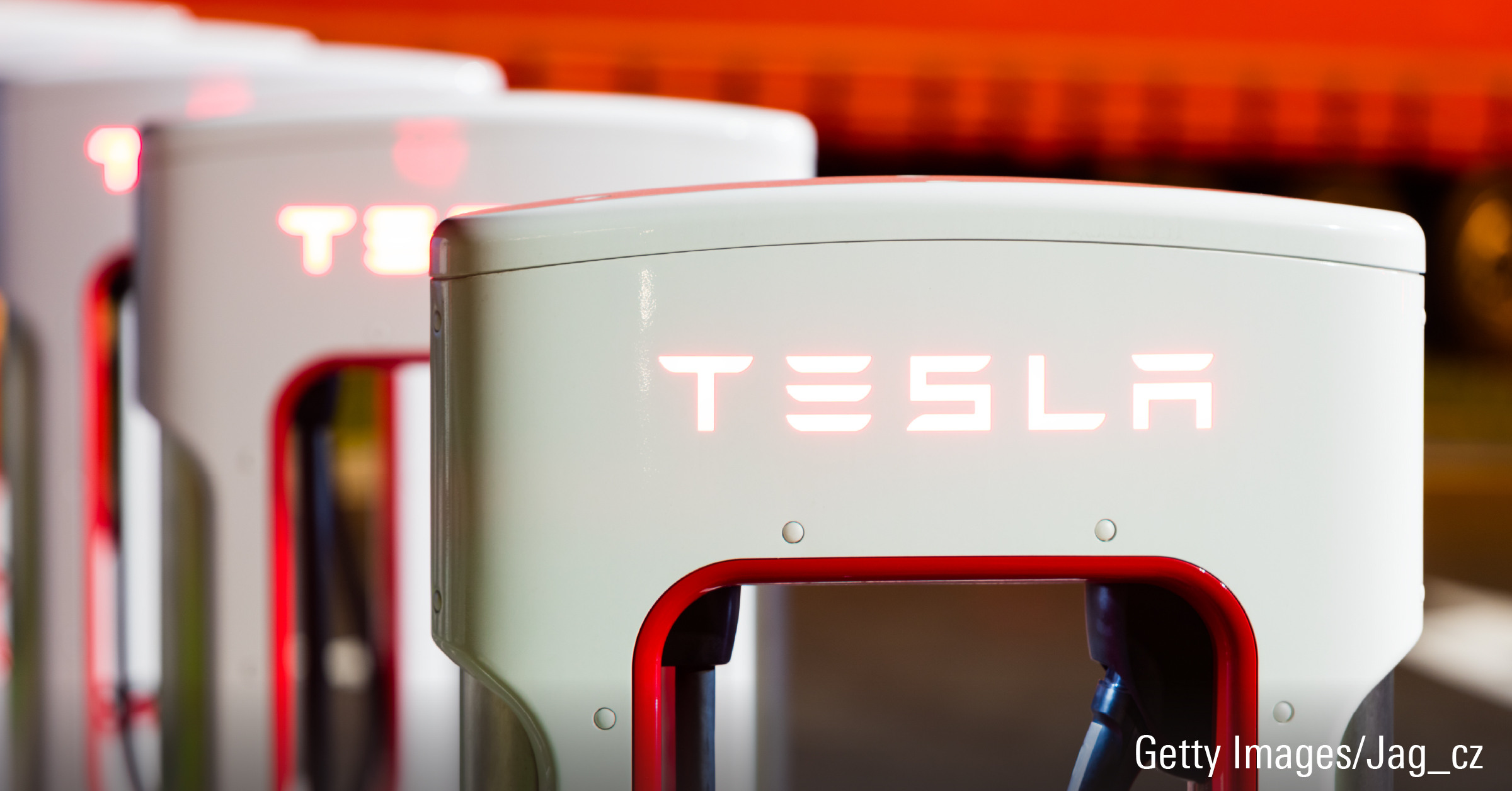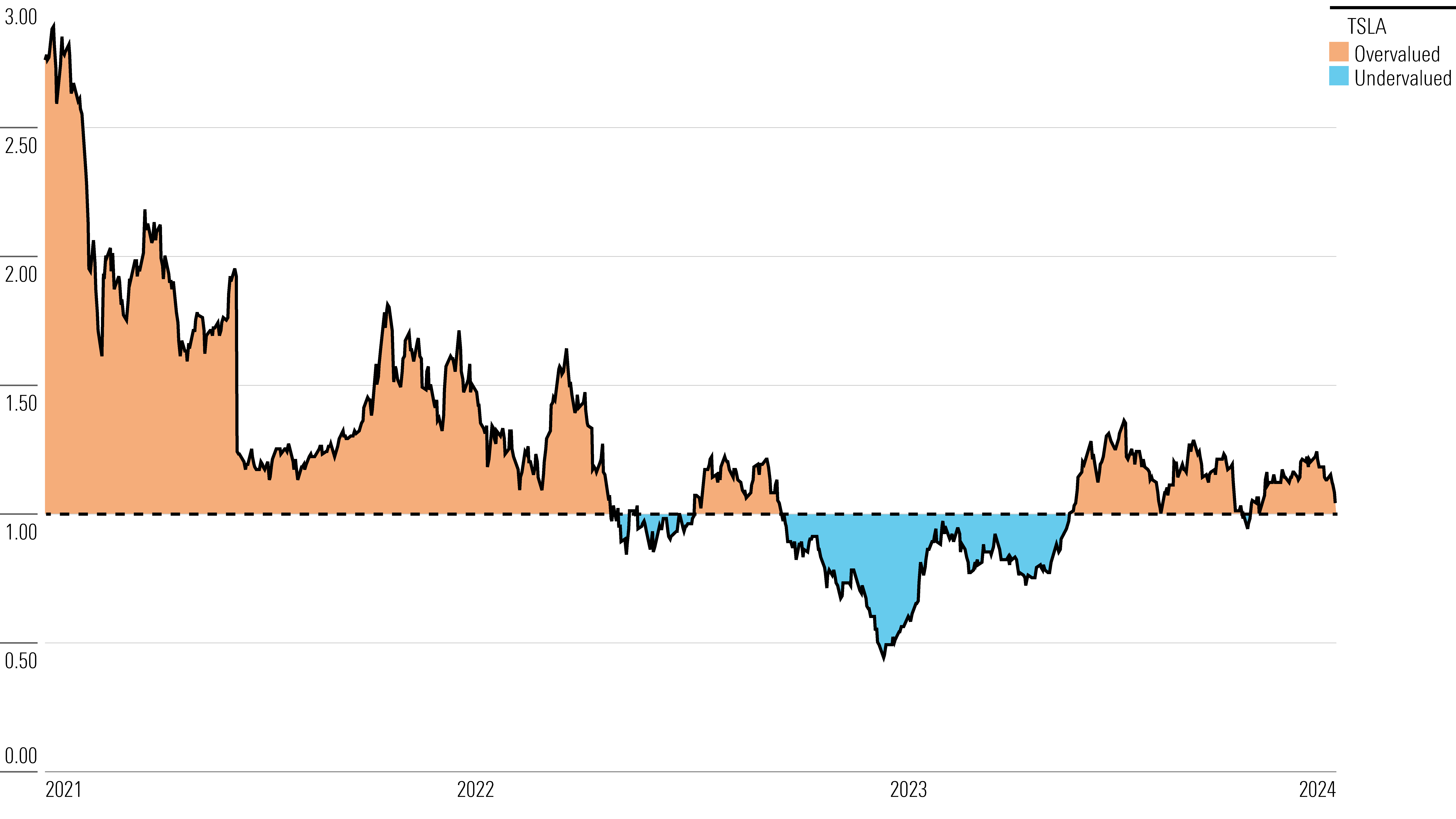Going Into Earnings, Is Tesla Stock a Buy, a Sell, or Fairly Valued?
With Tesla’s margins under pressure and an uncertain 2024 outlook, here’s what we think of its stock.

Tesla TSLA is set to release its fourth-quarter earnings report on Jan. 24, 2024, after the close of trading. Here’s Morningstar’s take on Tesla’s earnings and stock.
Key Morningstar Metrics for Tesla
- Fair Value Estimate: $210.00
- Morningstar Rating: 3 stars
- Morningstar Economic Moat Rating: Narrow
- Morningstar Uncertainty Rating: Very High
What to Watch for In Tesla’s Q4 Earnings
- Companywide operating profit margins: Tesla’s profit margins have fallen from a high of 17% in the third quarter of 2022 to under 8% in the third quarter of 2023. We will look to see how margins end up in the fourth quarter, given lower prices that are partially offset by lower raw material costs and record production and deliveries. Additionally, the growing profitability of the energy generation and storage segments should help companywide margins.
- Management’s 2024 outlook: While Tesla management does not provide guidance in terms of traditional financial metrics such as revenue or profits, the company did offer 2023 deliveries guidance of at least 1.8 million vehicles, which was met. We will look to see how management is thinking about 2024 in terms of growth with the existing vehicle lineup.
- New affordable vehicle launch: Tesla’s next wave of growth in the coming years will be driven by its new Model 2 platform, which will likely feature a smaller sedan and smaller SUV versus the Model 3 and Model Y. These vehicles will compete in the affordable vehicle segments, and in our view, they will be the key to Tesla reaching 5 million deliveries by 2030, up from over 1.8 million in 2022. We will look for an update on when these vehicles will likely launch.
- Tesla’s full self-driving capability: Once ready for full launch, FSD could immediately generate strong incremental revenue and profits for the company, and could be a key feature on Tesla’s vehicles that differentiates them from competitors. We will look for an update on progress toward a full working version of the software.
Tesla Stock Price
Fair Value Estimate for Tesla
With its 3-star rating, we believe Tesla’s stock is fairly valued compared with our long-term fair value estimate.
Our fair value estimate is $210 per share. We use a weighted average cost of capital of just under 9%. Our equity valuation adds back nonrecourse and non-dilutive convertible debt.
In the longer term, we assume Tesla will deliver around 5 million vehicles per year in 2030. This includes fleet sales, an expanding opportunity for the firm. Our forecast is well below management’s aspirational goal of selling 20 million vehicles by the end of this decade. However, it is nearly 4 times the 1.31 million vehicles delivered in 2022. Our forecast assumes Tesla increases its Model 3 and Model Y deliveries, that the Cybertruck is a success, and that the company ramps up volumes over several years. We also believe Tesla will ramp up semi-truck volumes over time.
Further, we forecast that Tesla will launch its sports car and eventually its affordable sedan and SUV platforms in the second half of the decade. We think the company will successfully continue to reduce its manufacturing costs on a per-vehicle basis. Combined with a shift to producing a greater proportion of higher-priced Model Y vehicles, we forecast segment gross margins will expand to roughly 30%, near the 29% level achieved in 2022, as automotive profit growth grows faster than revenue over the medium and long term. We assume revenue growth and margin expansion from autonomous software sold on a subscription basis. We also assume the successful growth of the insurance business and increased profits from the charging business result in long-term profit growth and margin expansion in the “services and other” segment.
TESLA P/F Chart

Read more about Tesla’s fair value estimate.
Economic Moat Rating
We award Tesla a narrow moat, stemming from its intangible assets and cost advantage. The company’s strong brand cachet as a luxury automaker commands premium pricing, while its EV manufacturing expertise lets it make vehicles more cheaply than competitors.
We think Tesla’s moat sources will persist, letting the firm generate excess returns on capital. We see the potential for it to outearn its cost of capital over at least the next 20 years, which is the measurement we use for a wide moat rating. However, the second 10-year period carries significant uncertainty for both Tesla and the broader automotive industry, given the rapid advancement of autonomous driving technologies, which could transform how consumers use vehicles. As such, we view a narrow moat rating, which assumes a 10-year excess return duration, as more appropriate.
Read more about Tesla’s moat rating.
Risk and Uncertainty
We assign Tesla a Very High Morningstar Uncertainty Rating, as we see a wide range of potential outcomes for the company.
The automotive market is highly cyclical and subject to sharp demand declines based on economic conditions. As the EV market leader, Tesla is subject to growing competition from traditional automakers and new entrants. As new lower-priced EVs enter the market, Tesla may be forced to continue to cut prices, reducing its industry-leading profits. With more EV choices, consumers may view Tesla less favorably. The company is investing heavily in capacity expansions that carry the risk of delays and cost overruns. It is also investing in R&D to maintain its technological advantage and generate software-based revenue, with no guarantee these investments will bear fruit. Tesla’s CEO owns a little over 20% of the company’s stock and uses it as collateral for personal loans, which raises the risk of a large sale to repay debt.
Read more about Tesla’s risk and uncertainty.
TSLA Bulls Say
- Tesla has the potential to disrupt the automotive and power generation industries with its technology for EVs, AVs, batteries, and solar generation systems.
- Tesla will see higher profit margins as it reduces unit production costs over the next several years.
- Through the combination of Tesla’s industry-leading technology and its unique supercharger network, the company’s EVs offer the best function of any on the market, which should help Tesla maintain its market-leader status as EV adoption increases.
TSLA Bears Say
- Traditional automakers and new entrants are investing heavily in EV development, which will result in Tesla seeing a deceleration in sales growth and being forced to cut prices due to increased competition, eroding profit margins.
- Tesla’s reliance on batteries made in China for its lower-price Model 3 vehicles will hurt sales, as these autos will not qualify for U.S. subsidies.
- Solar panel and battery prices could decline faster than Tesla can reduce costs, resulting in little to no profits for the energy generation and storage business.
This article was compiled by Frank Lee.
The author or authors own shares in one or more securities mentioned in this article. Find out about Morningstar’s editorial policies.

/s3.amazonaws.com/arc-authors/morningstar/ca8d2ce1-cd0f-433b-a52b-d163be882398.jpg)
/cloudfront-us-east-1.images.arcpublishing.com/morningstar/U746MWXQHFFZPLSMTEJSUD7HLY.png)
/cloudfront-us-east-1.images.arcpublishing.com/morningstar/KPHQX3TJC5FC7OEC653JZXLIVY.jpg)
/cloudfront-us-east-1.images.arcpublishing.com/morningstar/OBA7UVI75RGFDOHGJTZ2FK542Q.jpg)
:quality(80)/s3.amazonaws.com/arc-authors/morningstar/ca8d2ce1-cd0f-433b-a52b-d163be882398.jpg)